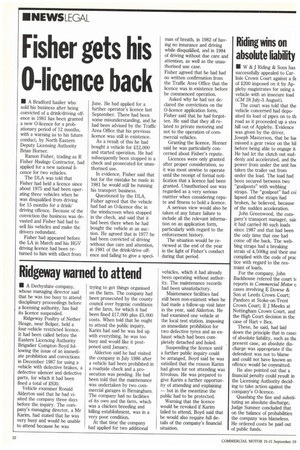Riding wins on absolute liability
Page 22

If you've noticed an error in this article please click here to report it so we can fix it.
• W & J Riding & Sons has successfully appealed to Carlisle Crown Court against a fu of £200 imposed on it by Appleby magistrates for using a vehicle with an insecure load (CM 28 July-3 August).
The court was told that the vehicle concerned had deposited its load of pipes on to th road as it proceeded up a stet hill out of Appleby. Evidence was given by the driver, Joseph Masterson, that he hat missed a gear twice on the hil before being able to engage it He had let the clutch out suddenly and accelerated, and the power from under the unit hat taken the trailer out from under the load. The load had been secured between two "goalposts" with webbing straps. The "goalpost" had col lapsed and the straps had broken, he believed, because of the sudden acceleration.
John Greenwood, the company's transport manager, sak it had carried 80 such loads since 1987 and that had been the only time that one had come off the back. The webbing straps had a breaking strain of 4,500kg and their use complied with the code of prac tice with regard to the restraint of loads.
For the company, John Backhouse refered the court t( reports in Commercial Motor o cases involving E Dowse & Son at Leeds Crown Court; Pandoro at Stoke-on-Trent Crown Court; E J Meeks at Nottingham Crown Court, and the High Court decision in the case of Hart v Bex.
These, he said, had laid down the principle that in case: of absolute liability, such as the present case, an absolute discharge was appropriate if the defendent was not to blame and could not have known an offence would be committed.
He also pointed out that a financial penalty could result in the Licensing Authority deciding to take action against the company's 0-licence.
Quashing the fine and substituting an absolute discharge, Judge Sumner concluded that on the balance of probabilities the company was blameless. He ordered costs be paid out of public funds.






























































